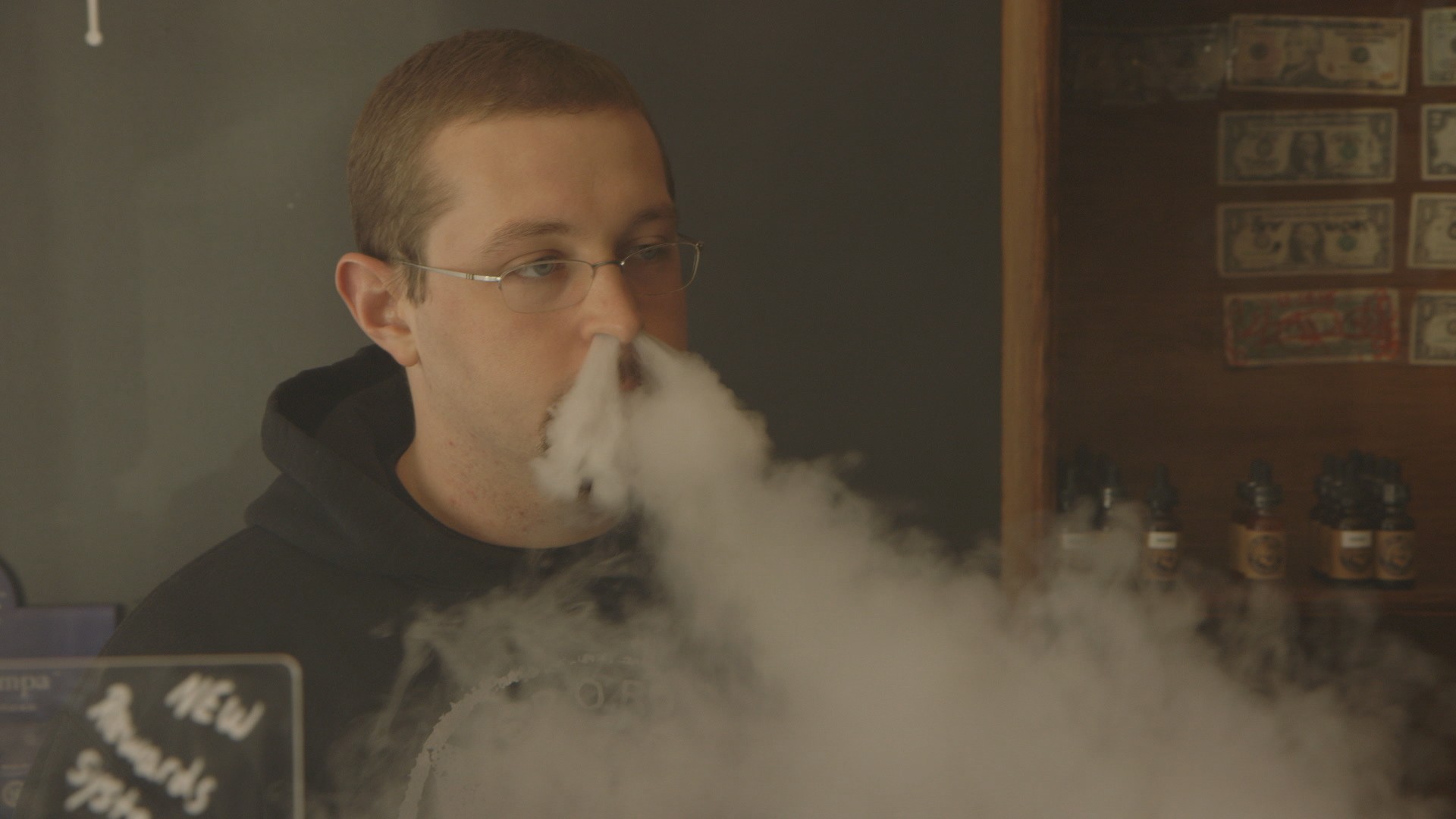Collage by Lia Kantrowitz
Whenever Matt Culley travels to England, he feels as if he has entered a sort of Twilight Zone.A prominent vaping advocate on YouTube in the United States, Culley went so far as to describe the scene in the United Kingdom, where he often attends conferences, as a sort of "alternate reality."Imagine: You're visiting a loved one in the hospital, and after popping into the cafeteria to eat a premade bologna sandwich or Jell-o, you're jonesing for a cigarette. Smoking, however, has been prohibited in or around the place—even in your car. You're out of e-juice, too. But that's not a problem: You're at the hospital, after all, and you can just run into the vape shop attached to it.That scenario may sound absurd, but it's plausible in England, where, in July, Sandwell and West Birmingham Hospitals actually agreed to allow a vape company to open stores on their property. The hope was that it would discourage people from smoking cigarettes outside."Meanwhile, in the U.S., now you have people going to vape shops and telling the owners that they're killing people," Culley said. "It's crazy."

Although experts canvassed by VICE acknowledged the U.K. is in no way immune to nicotine-related health problems, the American vaping crisis that has produced at least 1,000 cases of illness and roughly two-dozen deaths is pretty much nonexistent over there. There also appears to be far less official concern that vaping is a gateway drug sucking otherwise uninterested teens into a lifetime of nicotine use. Without lobbyists killing oversight and 1990s-style drug war hysteria hamstringing policy, U.K. officials have produced a piecemeal regulatory system that carefully monitors nicotine levels in vape products.The stark contrast has American harm-reduction advocates and their counterparts across the pond touting the U.K.'s measured approach to vaping as more logical than the full-throttle panic in Washington and state capitals across the country. The only problem is American institutions seem ill-equipped to emulate it."I think the difference between the U.K. and the U.S. are due to the American propensity to turn health issues into moral crusades," said Brad Rodu, a professor of medicine at the University of Louisville and an expert in tobacco-addiction harm-reduction, who also noted that another big issue is the bureaucratic mess in obtaining funding for research in the States. "It appears that policymakers in the U.S. are either completely ignorant of the history of tobacco, or completely ignore it."All the information Rodu needs is right in front of him: State after state, it seems, has begun to adopt a prohibitionist stance (on Tuesday, Montana became the most recent one to issue a sales ban on flavored e-cigarettes), and agencies like the Food and Drug Administration (FDA) are currently weighing whether to federally strip certain vaping products off the market. And though it might ultimately be difficult to directly compare statistics, as Rodu emphasized, pointing to the fact that vaping prevalence is measured according to different age groups and frequency (the U.K. doesn't judge regular use as harshly, say, as the U.S.), it's more important to recognize the mistakes that might be getting repeated.American regulators have been roundly criticized for moving too slowly to get a handle on vape products, only to embrace prohibitionary tactics, which could drive vapers back to cigarettes, or additional users to a black market that may very well be what's causing many of the illnesses in the first place. (Many of the cases so far seem to have been linked to THC products, which are often purchased on the black market, and vaping advocates have insisted flavor bans would only encourage people to experiment with mixing e-juices, even if they don't know what they're doing.)Likewise, state and federal crackdowns appear poised to cause small vape stores to begin closing, which could potentially hand over even more of the market to the giant JUUL, a company partially owned by the Big Tobacco producer Altria."It's basically reefer madness revisited in the U.S.," said Harry Shapiro, the director of DrugWise, a U.K.-based drug-education website, and the author of the Global State of Tobacco Harm Reduction report. "In the United States, you can go around firing guns, but they don't want you to vape. Which is to say, certainly, that there's a real disconnect between what counts as public safety and what people are actually, or should be, scared of."Of course, it's a tempting analogy to bring up—and others have done it before. But it's worth stating all of this plainly: These starkly opposite policies between the U.S. and its former colonizer are largely due to both the rhetoric surrounding e-cigarette use in the U.K.—health officials there have primarily touted these products as a safer alternative to traditional cigarettes, and as a helpful means to quit—and the fact that the country has stricter regulations in place. England wants to be smoke-free by 2030, and many public-health officials and politicians want vaping to help achieve that. It's a bit too early to say how effective this plan will be—it was announced this past July—but Shapiro said that's at least "a date for everyone to shoot for."Since 2016, the U.K. has been following the European Union's Tobacco Products Directive, which puts barriers on what advertising can be done and limits the nicotine strength in the liquids found in e-cigarettes. As CNN noted, that's capped off at 20 mg/ml, a restriction that's perhaps best understood by how it compares to what's common in JUUL pods—sometimes as much as 59 mg/ml."Where we differ most strongly is that we have some excellent politicians and people at Public Health England, or PHE, who are all committed to evidence-based decision-making and legislation," said Dave Cross, a trustee of the New Nicotine Alliance, a writer for the blog Planet of the Vapes, and a vaper himself.In short, it's all about perspective—as well as a shared vision for a collective goal. PHE, a government agency whose closest U.S. equivalent is the Centers for Disease Control and Prevention (CDC), has repeated its claim over and over again that "vaping is 95 percent less harmful than smoking.""The U.K. has a long history of adopting a harm-reduction approach for changing behavior and improving health," said Deborah Robson, a senior postdoctoral researcher in tobacco addiction at King's College London. "We have recognized, based on empirical research for several decades, that nicotine is not the harmful substance in tobacco. It's inhaling thousands of other toxic gases and particles of tar the come from setting fire to tobacco that harms and kills smokers."Whether Britain's robust framework would survive whatever form a potential Brexit took remained to be seen, but Robson said she suspected immediate, drastic changes were unlikely. People in the U.K. simply do not view nicotine the same way Americans do. This month, for example, which is designated as "Stoptober" to urge people to ditch smoking, the U.K.'s National Health Service (NHS) is literally pushing for smokers to switch from combustible cigarettes to e-cigs."Vaping is working here, as it would around the world if given the chance," Cross said. "Nobody is going to take that away from us."Sign up for our newsletter to get the best of VICE delivered to your inbox daily.Follow Alex Norcia on Twitter.
Advertisement

Although experts canvassed by VICE acknowledged the U.K. is in no way immune to nicotine-related health problems, the American vaping crisis that has produced at least 1,000 cases of illness and roughly two-dozen deaths is pretty much nonexistent over there. There also appears to be far less official concern that vaping is a gateway drug sucking otherwise uninterested teens into a lifetime of nicotine use. Without lobbyists killing oversight and 1990s-style drug war hysteria hamstringing policy, U.K. officials have produced a piecemeal regulatory system that carefully monitors nicotine levels in vape products.The stark contrast has American harm-reduction advocates and their counterparts across the pond touting the U.K.'s measured approach to vaping as more logical than the full-throttle panic in Washington and state capitals across the country. The only problem is American institutions seem ill-equipped to emulate it."I think the difference between the U.K. and the U.S. are due to the American propensity to turn health issues into moral crusades," said Brad Rodu, a professor of medicine at the University of Louisville and an expert in tobacco-addiction harm-reduction, who also noted that another big issue is the bureaucratic mess in obtaining funding for research in the States. "It appears that policymakers in the U.S. are either completely ignorant of the history of tobacco, or completely ignore it."
Advertisement
Advertisement
Advertisement
